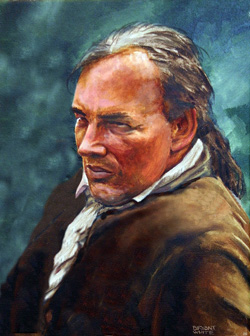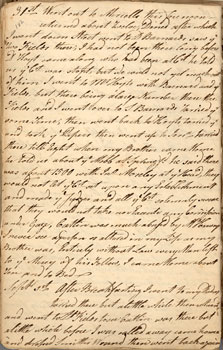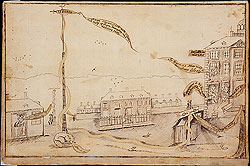People
Elihu Ashley
1750-1817

Elihu Ashley
© 2008 Bryant White
Prologue
Elihu Ashley was the second oldest son of 6 surviving children born to the Reverend Jonathan and Dorothy Williams Ashley. He was born in 1750 in Deerfield, Massachusetts, and raised by both his mother and Jin Cole, one of his family's "servants for life", the term then in use for slaves. Elihu would inherit Jin upon his father's death and she would then help care for Elihu's children. The family lived in a large house at the north end of the main street in Deerfield.(1)
Given his family's position and financial circumstances, Elihu was expected to pursue an occupation appropriate to his status. His decision to study medicine affirmed his professional and social standing. Entrants to the medical profession customarily worked with an established physician until their mentor deemed them ready to begin their own practice. Elihu studied with Dr. Thomas Williams, who lived a few houses up the street from the minister. In his detailed personal journal Elihu chronicled not only his active social life, but the growing tension in a community divided between Whigs and Loyalists in the years before the American Revolution.(2)

A page from Dr. Ashley's journal.
More info
Unsettled times
Elihu's father, the Reverend Jonathan Ashley, was one of Deerfield's more controversial ministers. He was a cousin of the well known Reverend Jonathan Edwards, who described the Reverend Ashley as a "young gentleman of liberal education and notable abilities; a fluent speaker; a man of lax principles in religion, falling in, in some essential things, with the Armenians[sic], and is very bold and open in it." He also proved to be unapologetically loyal to Great Britain until his death in 1780.(3) Young Elihu would prove to be as outspoken as his father in the tumultuous years leading up to the American Revolution.
On July 28, 1774, 24-year-old Elihu wrote in his journal, "Dick came and told me yr [there] was a Liberty Pole brought into Town…he desired I would go and cut it off,… I told him I would if he let me have a saw he went home & got one which I took; and went and sawd it about half off."
Elihu finished off the job later that same night with Seth Catlin and Phineas Munn. The next day he reported, "heard nothing but Liberty, and ye Poles being Sawd." While dining with Dr. Lemuel Barnard the following day, the conversation turned to the foolishness of liberty poles. Such poles were commonly erected in public locations by the "Sons of Liberty" as symbols of their opposition to the policies of the British government toward Massachusetts Bay and the other North American colonies.

His journal confirms what some suspected but that few knew as a certainty: that Elihu
had vandalized the Liberty Pole recently brought into Deerfield. This pen-and-ink drawing
depicts a Liberty Pole
erected in New York City in about 1774.
Deerfield was alive with speculation in the wake of Elihu's destruction of the liberty pole. On July 30, an anonymous writer posted a letter condemning the one who had sawn it in half as "some malicious Person, Inimical to his Country". The writer went on to report that although the liberty pole been erected again, a Tory pole had been erected as well. "Where," he asked, "are things going, that so sensible people as you the Town of Deerfield are, should suffer these Rascals to carry matters on so. I cannot help feeling, and very sensibly, when I think what the Consequences of these things will be & have no reason to think but that they will issue in blood." The author of this "anonymous" letter was none other than Elihu himself, who may have written it in order to allay suspicions that he had been the man wielding the saw. Elihu's anxieties that the charged political climate would result in turmoil and bloodshed were confirmed in the ensuing months. Unruly mobs harassed known and suspected Loyalists throughout the region. That September, Elihu's neighbor Phineas Munn was mobbed by the Whigs, or Liberty Men, and "forced to make his confession"(4). Munn would later flee to Canada. Elihu dolefully wrote,
Oh Tempore, all Nature seems to be in Confusion, every Person in fear of what this Neighbour will do to him such Times never were seen in New England. "(5)
In August, 1774, Elihu's older brother, Jonathan, was mobbed while attending the Court of Common Pleas in Springfield, Massachusetts. The British Parliament had recently the passed Massachusetts Government Act, transferring all judicial authority to the colony's newly-appointed military governor, General Thomas Gage. Outraged at this latest attempt by the English government to quash protest and unrest in its most unruly colony, Massachusetts Whigs formed a shadow government, the Massachusetts Provincial Congress. This body urged the people of Massachusetts to close judicial court sessions across the Commonwealth. Jonathan Ashley arrived in Springfield only to find hundreds of men armed with cudgels determined to prevent the court from opening. At home in Deerfield, Elihu endured anxious hours going from tavern to tavern hoping for news of Springfield and his brother. When a severely shaken Jonathan Ashley at last returned home that evening, his brother wrote that he had never "seen a person so altered as his brother."
The turmoil and lawlessness of these years instilled in Elihu a permanent contempt for extralegal protests and fear of the violence that often accompanied them. Unrest and unsettled politics did not prevent Elihu from completing his medical studies, but his career was not without controversy. Nathaniel Dwight, also of Deerfield, accused Dr. Ashley of infecting Dwight's granddaughter in Belchertown with smallpox through careless and negligent exposure to this most dreaded of diseases. Dwight wrote that in June, 1775,
Doct Ashley Sr you was at my house I understand Come down after a Stolen Surcoat Lodged at my house the next Day my Grandaughter made your bed and by that means broke out with the Small Pox a fortnitt after and the most of my family have bin much Exposed the Girl is removed about two miles from here and is now in the Greatest Extremity Doctor Pynchon is waiting to se whether She will Die or Live and how many more of my family will have it or where the End of it will be God only Knows… Doctor Pynchon Says you ought to pay a part of or all of the Expence: but if you Should pay it all it would but meanly Compensate the Damage if you Kill but one family in qualifying your Self to be a Doctr(6)
A few days later, Ashley responded to Dwight, countering that while he was certainly sorry Dwight's grandchild was infected with smallpox, he would never knowingly pass on such an illness, even to his worst enemy. He claimed that although he had visited a "pest house" and been exposed to the smallpox (on purpose as a form of inoculation), it had been a week since, he was not sick, and that he had changed his clothing numerous times before attending to Dwight's granddaughter. He suggested instead that the woman who made Ashley’s bed while he stayed at Dwight's inn, or even Ashley's own sisters all were more likely to have contracted the disease, which they had not. There is no record that Elihu offered any compensation to Mr. Dwight.(7)
Dr. Ashley briefly worked in Worthington, Massachusetts, but when his mentor, Dr. Thomas Williams, died in 1775, Elihu took over his Deerfield practice.
Elihu's journal recorded a lively social life. Interspersed among the more serious entries are many references to visiting, dances, parties, wedding celebrations and tavern visits. Elihu's journal also reveals that he was extremely fond of the company of young ladies, but in November of 1775, Elihu married the woman who figured most prominently in his diary. Mary, or, as Elihu called her in his diary, "Poy", was the daughter of Dr. Thomas Williams, the man under whom Elihu had studied medicine. Upon her father's death, the couple set up housekeeping in the Williams home and helped care for Mary's younger, and now fatherless, siblings. Elihu's first son, Thomas Williams Ashley, was born in August of 1776. When Elihu's own father died in 1780, Elihu and Mary moved into his father's home and assumed the care of his widowed mother. Elihu's second son, Robert, was born in 1782, and Mary followed in 1789.(8)
Loyalist hardships
Deerfield remained bitterly divided during the long years of the war. Control of the town meeting see-sawed back and forth between Loyalists and Whigs. In 1781, Elihu's older brother, Jonathan, helped lead a successful effort to force a town vote instructing the Deerfield representative to the Massachusetts General Court to urge the state to "Effect an accomodation Settlement & Peace between Great Britain & the United States of America without the futher effusion of Blood." Elihu Ashley was among those who voted for the measure.(9)
As a consequence of these and other activities, Jonathan Ashley, Seth Catlin and John Williams were arrested and imprisoned in Boston under suspicion of Loyalist activities. The trio were accused of "using their utmost efforts to prevent furnishing supplies of Men and provision for the army of the United States" and of being "unfriendly to the Independence of the United States".(10) In March, they petitioned for their release. In his appeal, Jonathan referred to his poor health, and that he had to support a wife and 4 daughters, and an ailing widow mother with only a 13 year-old servant boy for assistance. All three men were finally released in April, 1781. Already ailing before his arrest and imprisonment, Elihu's brother died four months later.(11)
Epilogue
Dr. Elihu Ashley stopped into John Williams' store on a November day in 1783 to purchase the sugar and West Indies rum that had been hard to come by during the war. As he looked around the bustling interior, perhaps he was reminded of the time John and his brother had spent in jail and the past troubles Loyalists in Deerfield had faced.

On November 14,1783, Dr. Ashley purchased 14 pounds of sugar and 2 quarts of West
Indies rum at John Williams' store in Deerfield.
Elihu may have wondered how long this new peace would last and how well former Loyalists, especially those such as John Williams, who had been more outspoken, would be received in the coming months. He may have reflected soberly on what neighbor might do to neighbor, should the current peaceful times in Deerfield come to an end.
Three years later, in the midst of Shays' Rebellion, the Massachusetts General Court required newly elected town officials in Deerfield to sign an oath of allegiance. sing the same wording demanded of former insurgents seeking a pardon, the oath revealed the state government's fears about the nature and extent of the Regulator movement. By signing the oath, town officers renounced any allegiance to the king of England and promised to remain faithful to the Commonwealth of Massachusetts and help to keep it a "free, sovereign, and independent state." Elihu Ashley remained faithful to the Commonwealth until his death in 1817.(12)

By taking this mandatory oath in 1787 as a selectman in Deerfield, Elihu Ashley
condemned Shays' Rebellion and conveyed his firm commitment to law and order.
More info
About This Narrative
Note: All narratives about people are, to the extent possible, based on primary and secondary historical sources.
See Further Reading for a list of sources used in creating this narrative. For a discussion of issues related to telling people's stories on the site, see: Bringing History to Life: The People of Shays' Rebellion
| Print | Top of Page